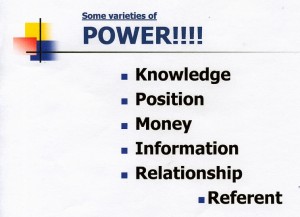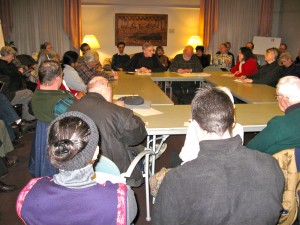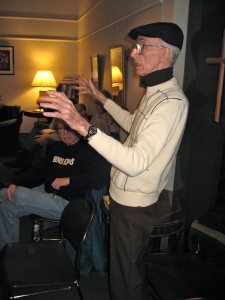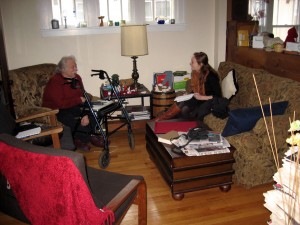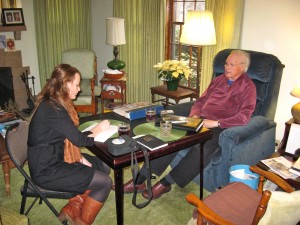#508 – Dick Bernard: Remembering Saul Alinsky
UPDATE see end of this post
Thanks to a column in today’s Minneapolis Star Tribune I was reminded of long ago memories of Saul Alinsky.
No, I didn’t know him, but I certainly knew of him, and he had considerable influence on my early work as a teacher union organizer.
Yesterday was Saul Alinsky’s 100th birthday. I’d never really looked him up till today, and I was fascinated by what I found.
Alinsky died June 12, 1972. At the time of his death, I had been a union organizer for all of three months. In the fall of that same year I went to Washington for basic training in organizing, and without knowing he was dead, I got some excellent training in some of the Alinsky methodology.
I remember particularly the phrase, “personalize, polarize and publicize”. You couldn’t organize against a thing, so you organized against some person who was powerful, and could represent evil, and then you’d publicize the daylights out of that polarity. (If you see similar things happening today from the right wing, you’re right – they’ve been using Alinsky’s tactics for years…while they ridicule Alinsky.)
I also recall Alinsky’s success in getting some fairness for sanitation workers at O’Hare Airport in Chicago. Management was not much inclined to deal with these lowly workers, so a plan was hatched: workers occupied every stool and urinal in every restroom, and quickly got everyone’s attention. There was a settlement. (Was this a real incident? Someone let me know. It is a vivid memory.)
Alinsky’s clientele had no power, as power is traditionally described in this society. So his members had to be creative, and united.
In 1972, Minnesota teachers had just achieved the right to bargain collectively, and were just beginning to see the possibility of at least a little parity in the relationship between management and labor.
The first decade was an interesting one: those holding power had no particular interest in relinquishing any of that power; those who had had little power, had to learn by trial and error how to achieve power without completely upsetting the system for which they worked.
Abundant mistakes were made on both sides in those early years, but in time a certain equilibrium was reached, and it would be my guess that most managers with any sense would see that a union can be, if not set up as the enemy, a force for stability and for good within the work place. It is, after all, not in anyone’s best interest to have a chaotic system without fairness (though I am sure there are plenty who would love to go back to their imagined perfect world where all the rights reside with management.)
In Alinsky’s world, the powerless were the priority.
In today’s world, the powerful learned from Alinsky too, and are trying to use the same methods to take complete control once again. What the powerful may have to learn the hard way is that there is a cost to their success, and the cost accrues to them in the long run.
Labor, whether organized or not, needs to look with great caution on attempts to remove rights to organize and bargain collectively and get independent redress of grievances.
Wisconsin, Ohio and Indiana are experiments in destroying unions; I know that there are similar wishes among some elements in Minnesota as well, and perhaps in other states.
Happy Birthday, Saul.
And give the working people the determination and courage to assert their rights to fairness in this increasingly unbalanced economic world that is the U.S.A.
UPDATE: Comment from Bob Barkley, Ohio:
Your thoughts regarding Saul Alinsky are right on target.
I was never trained in his methods but those of us in the teacher organizing of the 1960′s and 1970′s were disciples even if we didn’t know it. I started in 1966 had often quite unconsciously followed the Alinksy model over and over.
And quite ironically, I had it applied against me when I became “management” within our union.
Needless to say, it works. And it is the centerpiece of much that is done today by the very folks who criticize it so vehemently. The GOP right wing uses Alinsky methods to criticize Saul Alinsky. How ironic.
UPDATE Feb 22, 2012:
Yesterday friends and former colleagues John Borgen, Corky Marinkovich and I met for lunch. John showed us a package of old photos from MEA staff days. Here are the photos, through the magic of scanning and facebook. I have deliberately not labeled the photographs. The photos are undated, but the photo envelope says “copyright 1981” and the demeanor of the staff indicates it was a serious meeting, probably in the summer, before a very difficult fall in Minnesota. The setting was probably a staff union meeting.
There were, at that time, perhaps 40 professional staff in MEA. Likely most were at the meeting. For all the reasons everyone who has ever tried to photograph all people at a gathering, many are missed. I have not named the 22 people who can be identified on the photos. They are listed in alphabetical order here, for those of their colleagues who may have known them.
Thanks for the memories, John!
Darrell Baty
Pinky Bennett
Dick Bernard
Bob Black
John Borgen
Ken Bresin
Carl Erickson
Audrey Erskine
Sandy Fields
Curt Forbes
Wayne Hyland
George Jungermann
Chuck Kehrberg
Ed Leipold
Corky Marinkovich
Paul Moen
Dave Moracco
Charley Shaffer
Nancy Sinks
Doug Solseth
Stephanie Wolkin
Sue Zagrabelny
UPDATE March 7, 2012
Several of us attempted to reconstruct the remaining members of the staff at that time. Subject to error, here’s what we came up with:
Roger Barrett
Ken Berg
Don Berger
Judy Berglund
Ralph Chesebrough
Cheryl Furrer
Bob Larson
Chuck Lentz
John Martin
Peter Pafiolis
Kenn Pratt
Chuck Purfeerst
Bob Reed
Al Sollom
Hank Stankiewicz
Carol Sulovski (later Berg)
Mary Rose Watson
Larry Wicks
Duane Wilson (?)


